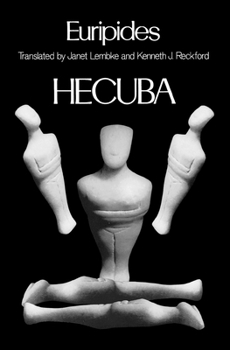Hecuba
Select Format
Select Condition 
Book Overview
Based on the conviction that only translators who write poetry themselves can properly recreate the celebrated and timeless tragedies of Aeschylus, Sophocles, and Euripides, The Greek Tragedy in New Translation series offers new translations that go beyond the literal meaning of the Greek in order to evoke the poetry of the originals. Under the general editorship of Peter Burian and Alan Shapiro, each volume includes a critical introduction, commentary...
Format:Paperback
Language:English
ISBN:0195068742
ISBN13:9780195068740
Release Date:April 1991
Publisher:Oxford University Press, USA
Length:112 Pages
Weight:0.55 lbs.
Dimensions:0.3" x 5.4" x 8.0"
Customer Reviews
4 ratings
Queen - Slave - Animal...
Published by Thriftbooks.com User , 15 years ago
This book was an assigned book for a composition class I'm taking. Still - I feel in love with the translation - reading the play through and through again. The language and rhythms - the Greek tragedy is no surprise - and everyone is dead, dying, will die or prophesied to die - but I loved the control that Hecuba exerts over everyone even as a slave heading to her now service - her kingdom of Troy in ruins. After finishing I went into the notes and intro which were nearly as good as the play. Now - onto King Lear!
A first look by Euripides at the tragic character of Hecuba
Published by Thriftbooks.com User , 21 years ago
Troy has fallen and its queen, Hecuba, has become the slave of Odysseus, who takes away her daughter Polyxena to be slain on the grave of Achilles. However, in this drama it is the earlier death of another child, Polydorus that provides the motivation for what comes to pass. This was a child who had been sent (according to Homer, there are various versions of this tale) for safety to the Thracian Chersonese. But now, after Hecuba hears of the death of Polyxena, the body of Polydorus washes up on shore. Apparently Hecuba's son-in-law Polymnester murdered the boy for the gold, which King Priam had sent to pay for his education. Agamemnon hears Hecuba's pleas, and Polymnester is allowed to visit the queen before she is taken away into captivity.The most fascinating aspect of "Hecuba" is that it gives us an opportunity to contrast the character of the queen of fallen Troy in this play by Euripides with that in his more famous work, "The Trojan Women." This play was performed ten years before the other and its events take place right before the other play as well, although there is some overlap when Talthybius informs Hecuba of the death of Polyxena. In both dramas Hecuba is a woman driven by a brutal and remorseless desire for vengeance; however she proves much more successful in this drama than she does in "The Trojan Women." This is an unusual play for Euripides is that the gods do not appear; the prologue is given by the ghost of Polydorus and the exodos are the slave women heading off to the ships (again, contrast this with "The Trojan Women"). Hecuba has harsh words for Helen, as in the other play, but her son Paris receives his fair share of approbation as well. This play also makes reference to the myth that Hecuba would meet her own hideous death, which reinforces the idea that there is much more of a moral degradation of her character in this play (set up by much more humiliation and degradation in the first half). On an entirely different level, "Hecuba" is comparable to Aeschylus' "Orestia," since he addresses the question of the difference between revenge and justice, so while the "Hecuba"/"Trojan Woman" analog is the most obvious and the most fruitful, it is not the only possibility.
The Destruction of the Human Soul
Published by Thriftbooks.com User , 23 years ago
Hecuba is one of the most profound, and profoundly pessimistic dramas ever written. It shows Hecuba, who had been Queen of Troy, now facing the ultimate devastation. She has already lost everything except her two youngest children. Now she will lose them, not to war but to politics and human greed. She loses herself to the need for vengeance, succeeds and loses her humanity. It is a shattering story and the Introduction by Kenneth Reckford in which he examines the meaning of the play is worth the price of the book.
War and loss driving Hecuba mad.
Published by Thriftbooks.com User , 24 years ago
Hecuba was the wife of Priam, King of Troy, and the mother of Hector, Paris, Cassandra, and others. At the start of this play of Euripedes, the war between the Greeks and Troy is over and Hecuba is now a slave of Agamemnon. The ghost of Achilles had appeared and demanded a sacrifice over his tomb before the Greeks can set sail for home. They vote to sacrifice Polyxena, Hecuba's young daughter, despite the tears and entreaties of Hecuba. After Polyxena's noble death, Hecuba learns that her last child Polydorus had been murdered by the King of Thrace, Polymestor, to whom Polydorus had been sent for safe keeping. This finally drives Hecuba mad and she seeks vengence for Polydorus's death. Euripedes shows in this play the effects of war and vengence on innocent lives and how cruel men at war can be.





